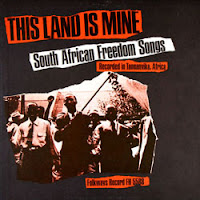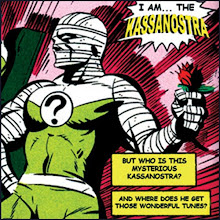There's no that much I can tell you about Tina Sizwe (alternately: Thina Sizwe/Mabayeke/Mayibuye). It's not in the slices proper, what with it being a choral number all the way. Pete Seeger says the music is from a hymn, but doesn't specify which one. The lyrics are in Zulu, and the song is mostly associated with the anti-apartheid movement in South Africa, although nothing in the song is specifically regional. Basically, it's "Yankee go home" expressed as sublimely as you'll ever hear it.
Side B, Band 5: Thina Sizwe
That version's off a 1966 Folkways comp album, This Land Is Mine. No performer info for this or any other song: "They were all recorded... by young people who are refugees from South Africa... Some have death sentences hanging over their heads... For this reason no photographs of them could be taken." Presumably, that also goes for the no-names policy in the liner notes. (One assumes, anyway. Not to make light, but Folkways was notoriously wretched at providing basic info like that across its catalog.) The album, which also includes Nkosi Sikeleli Afrika, has is own folksy charm, but, well... there's a reason we usually buy records made by professional singers. Just prior to its release, Mary-Louise Hooper organized a South African benefit at Hunter College, which included Martin Luther King, Jr., Seeger and Miriam Makeba among its participants. Just a guess, but there's a strong likelihood that This Land Is Mine was rushed out to capitalize on nascent anti-apartheid sentiments.
By that time, the song had already been a part of Seeger's repertoire for several years. After her deportation from South Africa in the late 1950s, Hooper passed along a tape of ANC fight songs to Seeger, and in 1960 Folkways released a four-song EP, South African Freedom Songs, which also include Asikatali. Most likely, this is the first widespread exposure (relatively speaking) of either song to Western audiences. Along with Seeger, the makeshift choir includes Guy Carawan (the man who taught We Shall Overcome to SNCC), and several members of the Belafonte Folk Singers, including Garrett Morris. Yeah, that Garrett Morris:
Man, sometimes life is just too awesome for words.
Pete Seeger, Robert Harter, Garrett Morris,
Guy Carawan & Ned Wright: Tina Sizwe
Anyway, permit me a few thoughts:
- If anyone out there knows anything about the song's history, definitely get in touch. I'm dying to know how a song whose basic sentiment is "Africa for the Africans" ended up attached to a Western song structure. The incongruity is killing me. (Assuming that's even correct. Are there Bantu hymns? C'mon people, educate me.)
- On the 1960 EP, the song's title is translated as "We, the Brown Nation." On the 1966 LP (remember, same label), the translation is "We the Africans." Ladies and gentlemen, the Civil Rights Movement: alive and paying dividends!
- If you get a chance, the EP's liner notes are worth a read. A decade earlier, Seeger (along with The Weavers) released Wimoweh, and was ultimately criticized both for butchering (and politicizing) that tune in his attempt at a translation, and for assuming it was a public-domain folk song. (It was actually written by Solomon Linda, whose family spent years trying to recoup lost royalties.) Perusing the notes, I assume the considerable attention paid to the Zulu pronunciations, as well as royalties distribution, are signs of Pete having learned from past mistakes. So bully for him.
- I didn't know anything about Mary-Louise Hooper before researching this post. As it turns out, hers is a fascinating story -- the kind that usually earns one an Olympic team in their honor. But the novelty of the Garrett Morris connection had me so jazzed up on the unpredictability of the universe that for a week I convinced myself she was actually enigmatic NOLA soul spitfire Mary Jane Hooper. Now those odds coming through would've blown my head...
Mary Jane Hooper: I've Got Reasons
Finally, there are a number of versions of Tina Sizwe floating around, but I'm not crazy about most of 'em, which usually throw modern embellishments into the choral arrangement. Usually I appreciate that kind of thing, but not with this tune. Maybe because it's a product of its times. The song itself, while of great historical import, no longer speaks to the current socio-political situation in South Africa (or Africa as a whole for that matter). Modern performances are fine, but messing with the arrangement would be like adding glissandos to We Shall Overcome: pointless on the merits; even more so because that song evokes a specific era of struggle, and doesn't necessarily travel well outside that frame.
Or maybe I just think all those other versions are serious crapola compared to this cut from Harry Belafonte, which strips the original of its dirge-like solemnity and makes it something else entirely. I honestly can't tell you what that something else is, except that it's celebratory and light-hearted and utterly amazing. It's the kind of arrangement someone might apply long after the fact -- after struggle begats victory, begats remembrance, begats nostalgia -- except that Belafonte recorded this in 1965, in the middle of an ocean of struggle with no land in sight. It's something only a true master of the craft would ever attempt: to infuse a song so heavy and august with his own wide-open optimism, and to do it with so much panache that the Zulu practically reveals itself as a long lost romance language.
Harry Belafonte: Mabayeke
We the brown nation
We cry for our country
That was taken by the white people
They must leave our land alone
They must leave our land alone
We, the children of Africa
Are crying for Africa
That was taken by the white people
They must leave our land alone
They must leave our land alone
Peace & Vinyl,
The KassaNostra





Welcome back! YOu were missed. Though it doesn't appear in the sheets, Thina Sizwe was a favorite back in my day. The beautiful harmonies and message (but still really easy) made it a perfect choice for us back in the 60's.
ReplyDelete